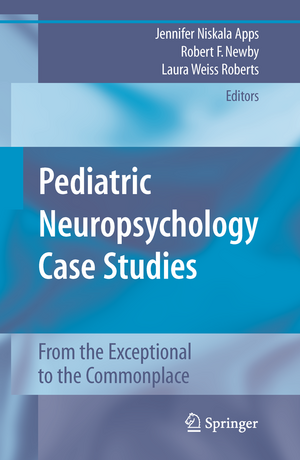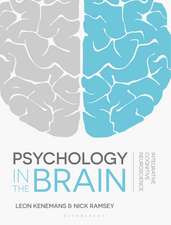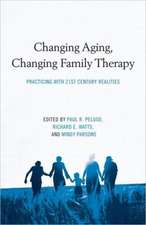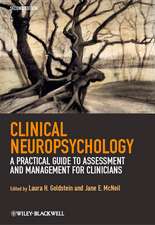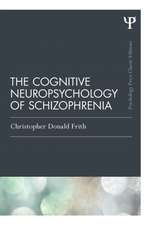Pediatric Neuropsychology Case Studies: From the Exceptional to the Commonplace
Editat de Jennifer Niskala Apps, Robert F. Newby, Laura Weiss Robertsen Limba Engleză Paperback – 4 mar 2010
This book will be structured in such a way that readers can easily access individual cases of interest, as well as related areas of dysfunction. Section breakdowns will be provided in order to highlight the combined focus of case presentations in acquired neuropsychological dysfunction as well as developmental disorders. Each section will begin with an introductory chapter, highlighting the salient feature of the concept and providing brief, up to date reviews of the current research and theories. Within each global section, individual case studies will serve as stand-alone chapters. Contributing authors will be provided extensive guidance and coaching with regards to the standard format and information to be included in each chapter.
The first section of this book will present cases involving neurological disorders. The intention of this section is to provide not only “classic” examples of neurological dysfunction in children, but also to provide interesting cases of unique or remarkable presentations. The second section will present an accumulation of cases representing both common and progressive conceptualizations of developmental disabilities. Section three has been designed to highlight cases which often present complex issues to neuropsychologists. The case examples in this section will highlight the use of alternative treatments, pathologies that are often a source of inquiry, and situations that lack the more rigorous scientific data often utilized in other diagnostic procedures. Additionally, this section may include chapters on common differential diagnosis dilemmas in clinical practice. Often multifaceted and even contradictory evidence can arise during evaluations, resulting in complex or problematic situations for the clinician. Such examples are difficult, by their nature, to forecast, but rather would be added during the book’s development, as they occur.
| Toate formatele și edițiile | Preț | Express |
|---|---|---|
| Paperback (1) | 1215.49 lei 6-8 săpt. | |
| Springer – 4 mar 2010 | 1215.49 lei 6-8 săpt. | |
| Hardback (1) | 1221.65 lei 6-8 săpt. | |
| Springer – 14 noi 2008 | 1221.65 lei 6-8 săpt. |
Preț: 1215.49 lei
Preț vechi: 1482.31 lei
-18% Nou
Puncte Express: 1823
Preț estimativ în valută:
232.58€ • 242.83$ • 192.49£
232.58€ • 242.83$ • 192.49£
Carte tipărită la comandă
Livrare economică 04-18 aprilie
Preluare comenzi: 021 569.72.76
Specificații
ISBN-13: 9781441960801
ISBN-10: 1441960805
Pagini: 382
Ilustrații: XVI, 366 p.
Dimensiuni: 155 x 235 x 28 mm
Greutate: 0.54 kg
Ediția:2008
Editura: Springer
Colecția Springer
Locul publicării:New York, NY, United States
ISBN-10: 1441960805
Pagini: 382
Ilustrații: XVI, 366 p.
Dimensiuni: 155 x 235 x 28 mm
Greutate: 0.54 kg
Ediția:2008
Editura: Springer
Colecția Springer
Locul publicării:New York, NY, United States
Public țintă
Professional/practitionerDescriere
In the recent literature, the most influential case study books in neuropsychology are in the adult realm. Pediatric neuropsychology is a rapidly developing field with increasingly greater influence in the assessment, diagnosis, early identification, and treatment of childhood illnesses. This book will provide the first centralized, comprehensive resource for case studies in pediatric neuropsychology. Not only will this supply a valuable compilation for the growing numbers of professionals in this field, but will also serve as an innovative and appealing resource for therapists, teachers, and others interested in child development.
This book will be structured in such a way that readers can easily access individual cases of interest, as well as related areas of dysfunction. Section breakdowns will be provided in order to highlight the combined focus of case presentations in acquired neuropsychological dysfunction as well as developmental disorders. Each section will begin with an introductory chapter, highlighting the salient feature of the concept and providing brief, up to date reviews of the current research and theories. Within each global section, individual case studies will serve as stand-alone chapters. Contributing authors will be provided extensive guidance and coaching with regards to the standard format and information to be included in each chapter.
The first section of this book will present cases involving neurological disorders. The intention of this section is to provide not only “classic” examples of neurological dysfunction in children, but also to provide interesting cases of unique or remarkable presentations. The second section will present an accumulation of cases representing both common and progressive conceptualizations of developmental disabilities. Section three has been designed to highlight cases which often present complex issues to neuropsychologists. The case examples in this section will highlight the use of alternative treatments, pathologies that are often a source of inquiry, and situations that lack the more rigorous scientific data often utilized in other diagnostic procedures. Additionally, this section may include chapters on common differential diagnosis dilemmas in clinical practice. Often multifaceted and even contradictory evidence can arise during evaluations, resulting in complex or problematic situations for the clinician. Such examples are difficult, by their nature, to forecast, but rather would be added during the book’s development, as they occur.
This book will be structured in such a way that readers can easily access individual cases of interest, as well as related areas of dysfunction. Section breakdowns will be provided in order to highlight the combined focus of case presentations in acquired neuropsychological dysfunction as well as developmental disorders. Each section will begin with an introductory chapter, highlighting the salient feature of the concept and providing brief, up to date reviews of the current research and theories. Within each global section, individual case studies will serve as stand-alone chapters. Contributing authors will be provided extensive guidance and coaching with regards to the standard format and information to be included in each chapter.
The first section of this book will present cases involving neurological disorders. The intention of this section is to provide not only “classic” examples of neurological dysfunction in children, but also to provide interesting cases of unique or remarkable presentations. The second section will present an accumulation of cases representing both common and progressive conceptualizations of developmental disabilities. Section three has been designed to highlight cases which often present complex issues to neuropsychologists. The case examples in this section will highlight the use of alternative treatments, pathologies that are often a source of inquiry, and situations that lack the more rigorous scientific data often utilized in other diagnostic procedures. Additionally, this section may include chapters on common differential diagnosis dilemmas in clinical practice. Often multifaceted and even contradictory evidence can arise during evaluations, resulting in complex or problematic situations for the clinician. Such examples are difficult, by their nature, to forecast, but rather would be added during the book’s development, as they occur.
Cuprins
Dangers of Childhood: Neurological Disorders.- Beating the Odds: Prematurity and Posthemorrhagic Hydrocephalus.- Never, Ever Shake a Baby: Pass It On.- Grand Larceny in the First Grade: Traumatic Brain Injury in the School-Aged Years.- A Slippery Descent: Adolescent Traumatic Brain Injury.- Steamrolled: Sports-Related Concussions.- Bad Signs: Sickle-Cell Disease and Stroke.- Life Interrupted: Medulloblastoma.- The Mystery of the Falling Grades: Seizure Disorder.- When Half a Brain is Better than One: Recurrent Seizures.- Pathological Left-Handedness: Stroke and Seizures.- Moving Forward: Psychotherapy with a Youth After Brain Injury.- Family Matters: Psychosocial Factors on Neuropsychological Outcome.- Dog Attack: Physical Trauma with Associated Brain Injury.- Back to Life: Anoxic Brain Damage in a Near Drowning.- How It Can All Go Wrong: Developmental Disorders.- The Energizer Bunny Meets Shirley Temple: Attention Deficit Hyperactivity Disorder, Combined Type.- “He is not Working up to Potential”: Atypical Attention Deficit Hyperactivity Disorder with Executive Weaknesses.- Sorting Sounds: Reading Disability with Phonological Awareness Deficit.- Well Compensated But Never Quite Solved: Lingering Dyslexia.- Emily Confronts Her Fiercest Bear: Word Reading Disorder with Naming Speed and Phonological Deficits.- A Tale of Two Assessments: Reading Fluency.- Lost in Space: Nonverbal Learning Disability.- Beyond Diagnosis: Applied Behavior Analysis Treatment of Moderate Autism Spectrum Disorder.- When Quirks and Quick Learning Create a Quandary: Mild Autism.- On Eggshells: Pediatric Bipolar Disorder.- It Helps to Know Genetic Basis: Williams Syndrome as an Example of Cognitive Disability.- Mixed Bag: Tics, Compulsions, and More.- Things that Go Bump in the Night: Interesting Questions and Controversies for Our Field.- A “Sensational” Way to Understand and Serve Children: Illustration of a Sensory Processing Model.- Sense and Sensibility: Relating Behavior Control Issues with Self-Regulation of Sensory Input.- Elusive, Inclusive, or Conclusive? (Central) Auditory Processing Disorder.- A Little of This, A Little of That: (Central) Auditory Processing Disorder.- A Hunt for the Elusive Neuropsychological Impairment: Conversion Disorder.- A Mystery of Perplexing Symptoms: Neuropsychological Assessment in a Case of Dysautonomia.- Erratum.
Recenzii
From The Clinical Neuropsychologist:"What sets this book apart from the rest is that it provides a series of unique learning tools that both the student and professional will find beneficial. … a must for any pediatric neuropsychologist providing clinical training to students … an excellent resource for practitioners and trainees alike." Amy V. Davis, The Clinical Neuropsychologist, Volume 23, Issue 7 October 2009 From Journal of the International Neuropsychological Society:"It was a bold and important decision by the editors to provide space for the discussion of topics such as sensory integration and central auditory processing disorder, which raise the passions of advocates on both sides of the issues.… Case studies are presented in a narrative style that is engaging and easily accessible … ideal for those in training or practicing early in their careers, as it will provide them with exposure to a wide variety of disorders, and the basic assessment tools and intervention strategies associated with these diagnoses." - Nancy L. Nussbauma, Journal of the International Neuropsychological Society, 16:397-398
Notă biografică
Jennifer A. N. Apps, Ph.D., is Assistant Professor, pediatric neuropsychologist, and Assistant Director for Research in the Division of Child and Adolescent Psychiatry and Behavioral Medicine at the Medical College of Wisconsin. Dr. Apps specializes in the evaluation and treatment of children with comorbid emotional and neurological disorders. She received her PhD from the University of Texas Southwestern Medical Center at Dallas and completed post-doctoral training at Children’s Hospital of Dallas. Her primary research interests are in the area of pediatric Bipolar Disorder. She has published several articles in professional journals and frequently gives both professional and educational lectures on pediatric mental health issues.
Robert F. Newby, Ph.D. is Associate Professor, pediatric Neuropsychologist, and Co-Director of the Neuropsychology Division of the Department of Neurology at the Medical College of Wisconsin. He specializes in the evaluation and treatment of children with neurological and learning disorders. He received his Ph.D. from the University of Kansas and completed an internship and postdoctoral fellowship at the University of Wisconsin Health Sciences Center in Madison. He has a Diplomate in Clinical Neuropsychology, awarded by the American Board of Professional Psychology and the American Board of Clinical Neuropsychology. Dr. Newby’s primary research interests have been in dyslexia, reading disabilities and Attention Deficit Hyperactivity Disorder. He has published articles in professional journals, book chapters, and a book for parents; he has received research grants from several foundations. Dr. Newby is on the Professional Advisory Board of the Wisconsin Chapter of the Learning Disabilities Association.
Laura Weiss Roberts, M.D., M.A. is Chairman and Charles E. Kubly Professor in the Department of Psychiatry and Behavioral Medicine at the Medical College of Wisconsin. Dr. Roberts is a career scientist funded by the National Institutes of Health, and a nationally recognized scholar and leader in ethics, psychiatry, medicine, and medical education. Before coming to Milwaukee, Dr. Roberts served as a Professor of Psychiatry, Vice Chair for the Department of Psychiatry and the Director of the Institute for Ethics at the University of New Mexico, where she completed her psychiatry training and then remained on faculty for 8 years. She is the Editor-in-Chief for the journal Academic Psychiatry and serves as an editorial board member and peer reviewer for many scientific journals. Dr. Roberts has received numerous awards for her scholarship, leadership, and teaching, and has been an invited speaker for over 100 presentations, workshops and seminars. A dedicated writer, she has written extensively on topics including clinical and research ethics, informed consent, clinical medicine, educational scholarship, end-of-life care, physician and medical student health care.
Robert F. Newby, Ph.D. is Associate Professor, pediatric Neuropsychologist, and Co-Director of the Neuropsychology Division of the Department of Neurology at the Medical College of Wisconsin. He specializes in the evaluation and treatment of children with neurological and learning disorders. He received his Ph.D. from the University of Kansas and completed an internship and postdoctoral fellowship at the University of Wisconsin Health Sciences Center in Madison. He has a Diplomate in Clinical Neuropsychology, awarded by the American Board of Professional Psychology and the American Board of Clinical Neuropsychology. Dr. Newby’s primary research interests have been in dyslexia, reading disabilities and Attention Deficit Hyperactivity Disorder. He has published articles in professional journals, book chapters, and a book for parents; he has received research grants from several foundations. Dr. Newby is on the Professional Advisory Board of the Wisconsin Chapter of the Learning Disabilities Association.
Laura Weiss Roberts, M.D., M.A. is Chairman and Charles E. Kubly Professor in the Department of Psychiatry and Behavioral Medicine at the Medical College of Wisconsin. Dr. Roberts is a career scientist funded by the National Institutes of Health, and a nationally recognized scholar and leader in ethics, psychiatry, medicine, and medical education. Before coming to Milwaukee, Dr. Roberts served as a Professor of Psychiatry, Vice Chair for the Department of Psychiatry and the Director of the Institute for Ethics at the University of New Mexico, where she completed her psychiatry training and then remained on faculty for 8 years. She is the Editor-in-Chief for the journal Academic Psychiatry and serves as an editorial board member and peer reviewer for many scientific journals. Dr. Roberts has received numerous awards for her scholarship, leadership, and teaching, and has been an invited speaker for over 100 presentations, workshops and seminars. A dedicated writer, she has written extensively on topics including clinical and research ethics, informed consent, clinical medicine, educational scholarship, end-of-life care, physician and medical student health care.
Textul de pe ultima copertă
Pediatric Neuropsychology Case Studies:
From the Exceptional to the Commonplace.
Edited by Jennifer Niskala Apps, Robert F. Newby, and Laura Weiss Roberts, Medical College of Wisconsin, Milwaukee
Pediatric Neuropsychology Case Studies combines an evidence-based guide to frequently seen neurological and developmental disorders in children with compelling case histories, highlighting the uniqueness of every young client—and the skills involved in providing effective evaluation and treatment for every client—to create an innovative, one-of-a-kind resource.
The book’s chapters, which can be read in sequence or in order of interest, offer typical and complex presentations of a broad range of developmental and acquired conditions including ADHD (combined, inattentive), traumatic brain injury (with age- and region-specific cases), psychiatric disorders, pervasive developmental disorders, systemic infections, reading and nonverbal disabilities, sensory and auditory problems, seizure disorders, and genetic disorders. Readers will appreciate the balance of coverage, whether it’s between mainstream and alternative treatments or neurological and psychosocial aspects of a case. A chapter that highlights the interaction between neuropsychological assessment and on-going therapeutic interventions is also included.
Helpful features in this practitioner-friendly volume are designed to enhance the reader’s clinical comprehension, analytical thinking, and decision-making skills:
From the Exceptional to the Commonplace.
Edited by Jennifer Niskala Apps, Robert F. Newby, and Laura Weiss Roberts, Medical College of Wisconsin, Milwaukee
Pediatric Neuropsychology Case Studies combines an evidence-based guide to frequently seen neurological and developmental disorders in children with compelling case histories, highlighting the uniqueness of every young client—and the skills involved in providing effective evaluation and treatment for every client—to create an innovative, one-of-a-kind resource.
The book’s chapters, which can be read in sequence or in order of interest, offer typical and complex presentations of a broad range of developmental and acquired conditions including ADHD (combined, inattentive), traumatic brain injury (with age- and region-specific cases), psychiatric disorders, pervasive developmental disorders, systemic infections, reading and nonverbal disabilities, sensory and auditory problems, seizure disorders, and genetic disorders. Readers will appreciate the balance of coverage, whether it’s between mainstream and alternative treatments or neurological and psychosocial aspects of a case. A chapter that highlights the interaction between neuropsychological assessment and on-going therapeutic interventions is also included.
Helpful features in this practitioner-friendly volume are designed to enhance the reader’s clinical comprehension, analytical thinking, and decision-making skills:
- Glossaries explain terminology essential to the cases.
- Common differential diagnosis issues are discussed.
- Relevant research findings and test data are reviewed for each chapter.
- Treatment recommendations are featured from best practice and emerging areas of study.
- Charts, tables, and callout boxes emphasize critical information.
Caracteristici
First book to utilize a case study approach in neuropsychology where the focus is entirely pediatric but not limited to one etiology.
Several chapters provide clinical case exemplifying innovative areas of diagnosis and treatment.
Colorful, intriguing chapter titles ranging from the exceptional to the ordinary
Several chapters provide clinical case exemplifying innovative areas of diagnosis and treatment.
Colorful, intriguing chapter titles ranging from the exceptional to the ordinary
